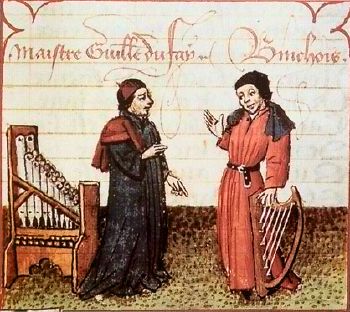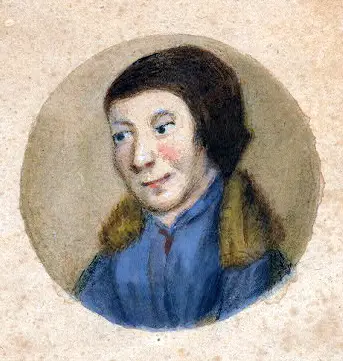Gilles Binchois
Gilles de Bins dit Binchois (c. 1400 – September 20,1460), was a Franco-Flemish School composer, one of the earliest members of the Burgundian School, and one of the three most famous composers of the early fifteenth century. While often ranked behind his contemporaries Guillaume Dufay and John Dunstable, at least by contemporary scholars, his influence was arguably greater than either, since his works were cited, borrowed, and used as source material more often than those by any other composer of the time.
Binchois' emotional French chansons spoke of a nostalgic and traditional courtly life with the nuances of tragedy and unrequited love.
Life
The composer's full name is Gilles de Bins dit Binchois, consisting of the byname "Gilles de Binche" (also spelled "Gilles de Bins") and the dit name Binchois (also spelled "Binchoys"). Binchois was probably from Mons, the son of Jean and Johanna de Binche, who may have been from the nearby town of Binche. His father was a councilor to Duke Guillaume IV of Hainault, and also had a position in a church in Mons.
Nothing is known about Gilles until 1419, when he became organist at the church of Ste. Waudru in Mons. In 1423 went to live in Lille. Around this time he may have been a soldier in the service of the Burgundians, or perhaps the English William de la Pole, 1st Duke of Suffolk, as indicated by a line in the memorial motet written on his death by Ockeghem.
Burgundian court
Sometime near the end of the 1420s he joined the court chapel of Burgundy, the exact date is unknown due to chapel's lost employment records from 1419 to 1436.[1] By the time of his motet Nove cantum melodie (1431) he was evidently a singer there, since the text of the motet itself lists all 19 singers.
The Burgundian court under Philip the Good was perhaps the most lively and prominent court of the area; its members compared it to that of Alexander The Great.The musicologist Reinhard Strohm commented that Philip's court of "eclectic and flamboyant culture typified the feudal aspirations of the age."[2]
Binchois was associated with the leading composer of his day, Guillaume Du Fay. They likely met, alongside the poet Martin le Franc, during a meeting at Chambéry of the Burgundian and Savoy courts in February 1434. It was probably here that Le Franc wrote his famous Le champion des dames poem, which depicts the two composers and blind Burgundian vielle players. The only certain meeting of the composers was in March 1449, when Du Fay resided with Binchois in Mons for a convocation of canons.[1]
Aside from Du Fay, important composer contemporaries of the region included Hugo de Lantins and Arnold de Lantins.[2]
The Burgundian chapel choir was unique in allowing its members to become clergy without being ordained as a priest; in 1437 Binchois became a subdeacon.[2] Probably due to Philip's favor, he held prebends for at least four churches until his death: St Donatian, Bruges (from January 7, 1430); Ste Waudru, Mons (from May 17, 1437); St Vincent, Soignies (from 1452); and St Pierre, Cassel (from May 21, 1459).[1]
He retired to Soignes, evidently with a substantial pension for his long years of excellent service to the Burgundian court.
Music and influence
Binchois is often considered to be the finest melodist of the fifteenth century, writing carefully shaped lines that are easy to sing, and utterly memorable. His tunes continued to appear in copies decades later, and were often used as sources for Mass composition by later composers.[1] Most of his music, even his sacred music, is simple and clear in outline, sometimes even ascetic; a greater contrast between Binchois and the extreme complexity of the ars subtilior of the previous century would be hard to imagine.
It is thought that considerably more of his sacred music survives than secular music, creating a "paradoxical image" of the composer best known for the latter.[3] Most of his secular songs are "rondeaux," which had become the commonest song form of the century; but Binchois rarely wrote simple strophic form, instead shaping his melody almost independent of the rhyme scheme of the verse. Binchois is best known for his lyric-driven secular French songs, known as chansons, which were widely transmitted and imitated by fellow composers. He wrote music for the court, secular songs of love and chivalry, music that was expected by the Dukes of Burgundy and that was evidently loved by them.
Notes
- ↑ 1.0 1.1 1.2 1.3 Stanley Sadie and John Tyrrell (eds.), The New Grove Dictionary of Music and Musicians (Oxford University Press, 2004, ISBN 978-0195170672).
- ↑ 2.0 2.1 2.2 Reinhard Strohm, The Rise of European Music 1380-1500 (Cambridge University Press, 2008, ISBN 978-0521619349).
- ↑ Andrew Kirkman and Dennis Slavin (eds.), Binchois Studies (Oxford University Press, 2001, ISBN 0198166680).
ReferencesISBN links support NWE through referral fees
- Kaye, Philip (ed.). The Sacred Music of Gilles Binchois. Oxford, England: Oxford University Press, 1992. ISBN 9780193530560
- Kemp, Walter H. Burgundian court Song in the Time of Binchois: The Anonymous Chansons of El Escorial, MS V.III.24. Oxford: Clarendon Press, 1990. ISBN 9780198161356
- Kirkman, Andrew, and Dennis Slavin (eds.). Binchois Studies. Oxford University Press, 2001. ISBN 0198166680
- Sadie, Stanley, and John Tyrrell (eds.). The New Grove Dictionary of Music and Musicians. Oxford University Press, 2004. ISBN 978-0195170672
- Strohm, Reinhard. The Rise of European Music 1380-1500. Cambridge University Press, 2008. ISBN 978-0521619349
External links
All links retrieved April 3, 2025.
- Gilles Binchois (ca.1400 — 20 September 1460) IMSLP
- Binchois, Gilles (ca. 1400–1460) The Digital Image Archive of Medieval Music
- Gilles Binchois Discogs
- Giles Binchois (c. 1400-1467) - Burgundy Belgium Music History
Credits
New World Encyclopedia writers and editors rewrote and completed the Wikipedia article in accordance with New World Encyclopedia standards. This article abides by terms of the Creative Commons CC-by-sa 3.0 License (CC-by-sa), which may be used and disseminated with proper attribution. Credit is due under the terms of this license that can reference both the New World Encyclopedia contributors and the selfless volunteer contributors of the Wikimedia Foundation. To cite this article click here for a list of acceptable citing formats.The history of earlier contributions by wikipedians is accessible to researchers here:
The history of this article since it was imported to New World Encyclopedia:
Note: Some restrictions may apply to use of individual images which are separately licensed.

